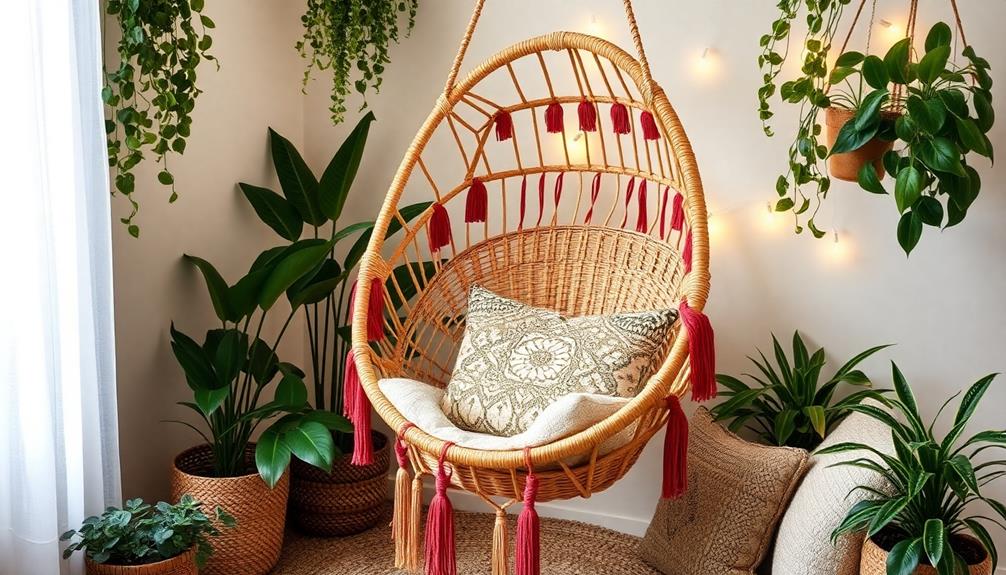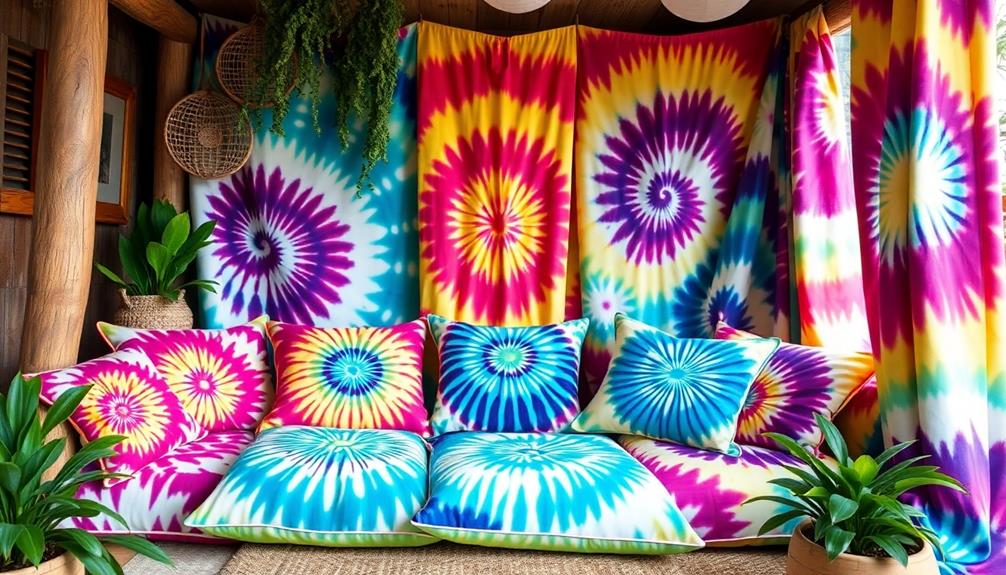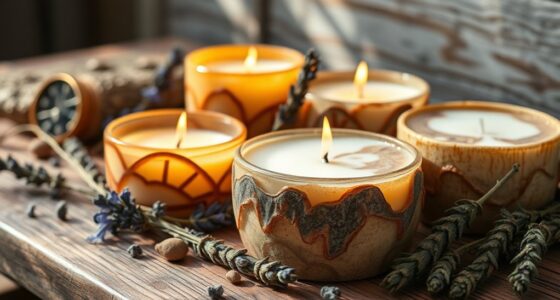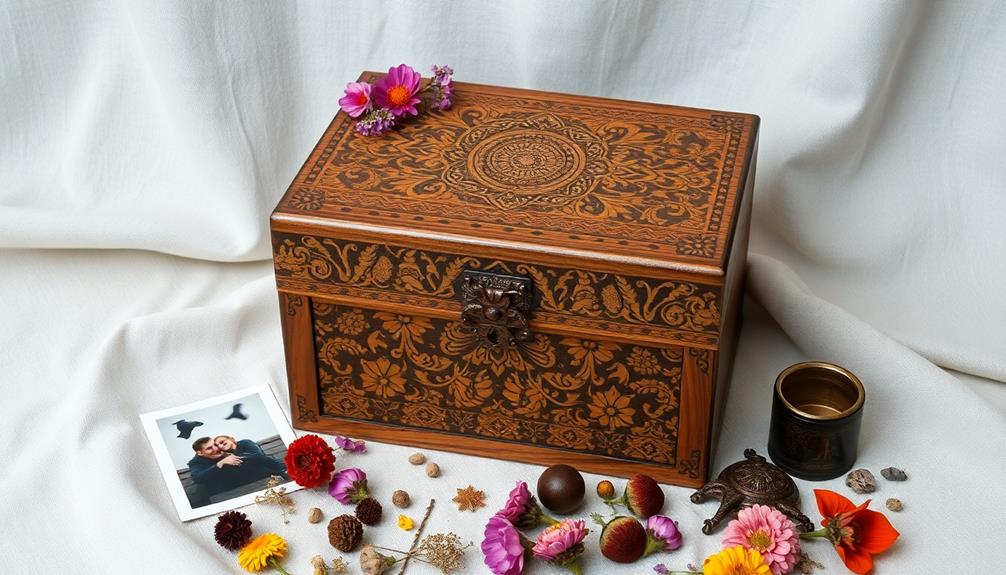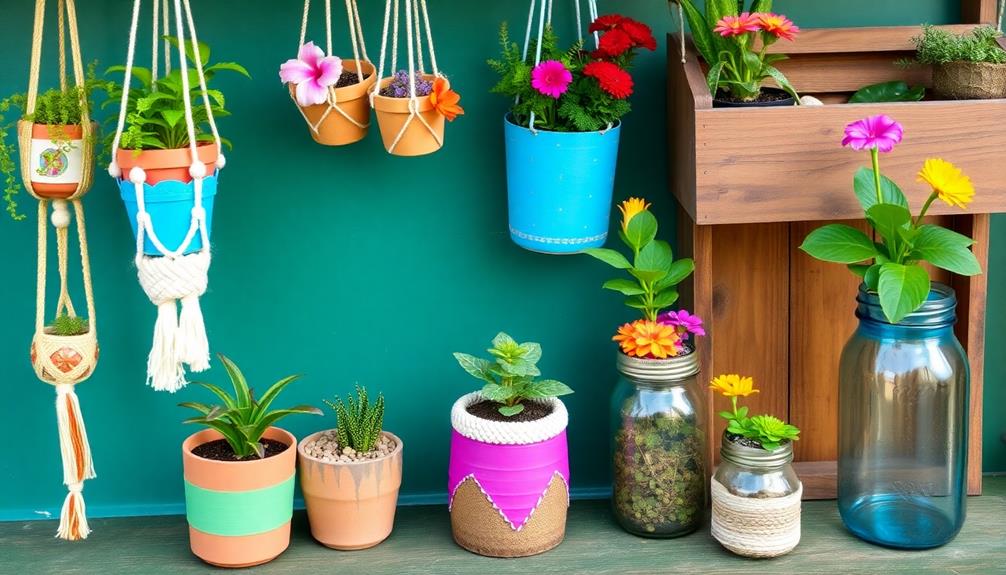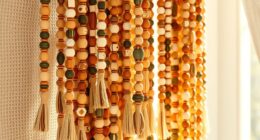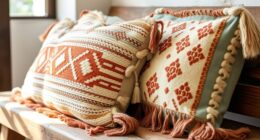Creating your own DIY hanging chair for your boho space can be a fun project that brings both style and comfort. You will need materials such as 2 yards of fabric, a sturdy wooden dowel, durable rope, and a metal clip. To begin, make a pocket in your fabric to prevent fraying and ensure a secure fit. Make use of square knots for stability and fiber ropes for support. Be sure to hang your chair at a comfortable height, typically around 4-5 feet. Regularly inspect your work for safety. Continue reading for detailed tips on creating the ideal hanging chair!
Key Takeaways
- Select 2 yards of fabric and 16 feet of durable rope to create a stylish and comfortable hanging chair for your boho space.
- Mark and drill holes in a 3-foot wooden dowel at 2-inch and 4-inch intervals for secure rope threading during assembly.
- Use basic and alternating square knots to ensure structural integrity and stability of the hanging chair.
- Choose a hanging height of 4-5 feet for easy entry and exit, adding cushions for enhanced comfort.
- Regularly inspect ropes and hardware for wear, ensuring safety and durability in your DIY hanging chair.
Project Overview and Design Considerations
When you commence the DIY Hanging Macramé Chair project, you'll find it's inspired by stylish designs from Urban Outfitters and crafted with insights from Mandi at Vintage Revivals. Since there aren't many tutorials available, you'll appreciate the step-by-step guidance that focuses on fundamental design considerations.
To enhance the learning experience as you build, consider incorporating eco-friendly materials that align with sustainable practices.
As you plan your hanging chair, keep in mind the comfort and stability it needs. Extensive trial and error may be necessary to achieve the perfect balance, ensuring the chair is durable and doesn't sag over time.
Consider using smaller hoops if your chair will cater to smaller users, while also designing it to accommodate various body sizes for inclusivity and safety.
You'll use over 200 feet of clothesline rope and basic knotting techniques, so it's vital to prioritize secure hanging methods.
Feedback from users emphasizes the chair's beauty and functionality, showing how thoughtful design can enhance your space.
As you navigate this project, remember the importance of clear instructions or video tutorials, which can make the building process smoother and more enjoyable.
Get ready to create a stunning piece that adds a boho touch to your home!
Materials Required and Construction Techniques
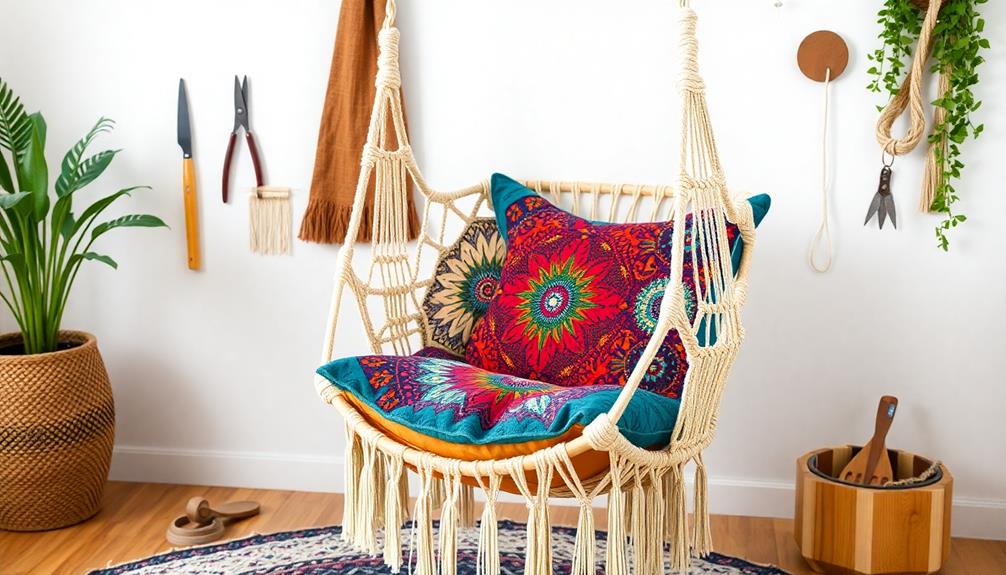
To kick off your DIY hanging chair project, gather essential materials that guarantee both functionality and style. You'll need 2 yards of fabric, a metal clip that supports up to 200 pounds, 16 feet of durable rope, and a 3-foot wooden dowel for structure. Head to your local hardware store to find these items, ensuring they're sturdy and free of defects.
Engaging your imagination in this project can reveal transformative possibilities, allowing you to create a piece that reflects your personal style and enhances your space, making it a source of tranquility.
Start the construction process by marking your wooden dowel for drilled holes at 2-inch and 4-inch intervals. This step's significant because it allows the rope to be threaded through securely.
When you're ready to cut the fabric, create a pocket by folding the top edge and sewing it to prevent fraying. Make sure this pocket is thick enough for the rope insertion.
Next, you'll secure the rope by tying knots and threading it through the dowel and fabric. Don't forget to create a center knot to attach your metal clip for hanging.
Once that's done, install your macrame chair in your desired location and add cushions for extra comfort. With these materials and techniques, you'll have a stylish and functional hanging chair ready for your boho space!
Knotting Techniques and Assembly Process
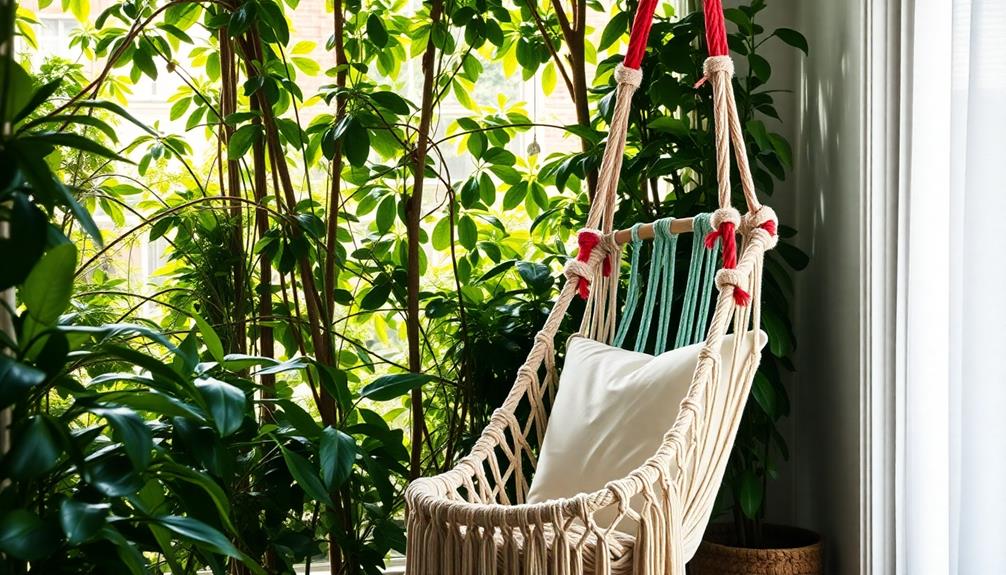
How can you guarantee your DIY hanging chair is both sturdy and stylish? By mastering knotting techniques and following a thoughtful assembly process, you can achieve both. Start by using a Basic Square Knot around the hoop, making sure your knots are tight and secure. Then, utilize alternating Square Knots throughout the chair's structure to create a robust framework.
Next, construct the seat separately using poster board for shape and reinforce ties between the walls and seat. For the ropes supporting the chair, employ a braid technique, ensuring the wood pieces are drilled properly for ideal rope placement and leveling.
Here's a quick reference table for your knotting techniques:
| Knotting Technique | Purpose |
|---|---|
| Basic Square Knot | Initial stability |
| Alternating Square Knot | Structural integrity |
| Braid Technique | Support for hanging |
| Reinforced Ties | Seat stability |
| Finishing Techniques | Aesthetic appeal |
Comfort and Safety Considerations
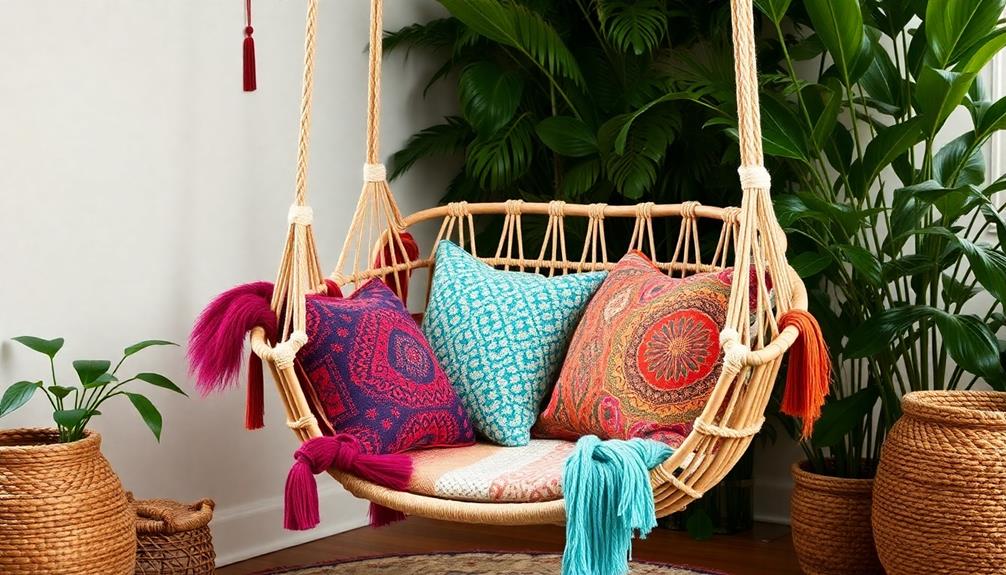
Comfort and safety are essential elements in creating a reliable DIY hanging chair. To begin, establish a weight limit that accommodates various body sizes, guaranteeing everyone can enjoy the chair comfortably.
Additionally, incorporating natural materials, such as reclaimed wood for the frame, can enhance the rustic charm of your boho space while maintaining functionality. Next, focus on secure attachment; always anchor the chair to ceiling joists with appropriate hardware, as key elements of modern farmhouse decor emphasize stability and authenticity. Avoid using drywall as it can lead to a dangerous collapse.
Regularly inspect the integrity of the ropes and hardware for any signs of wear and tear. This guarantees that they remain strong enough to support you safely during use.
For peak comfort, hang the chair at a height of 4-5 feet from the ground. This height allows for easy entry and exit while maintaining stability.
To enhance your comfort during extended use, consider adding cushions or padding to the chair. This makes it perfect for long reading sessions or simply relaxing.
Taking these comfort and safety considerations into account will help you create a hanging chair that not only looks great in your boho space but also provides a secure and enjoyable experience for you and your guests.
Community Engagement and Feedback
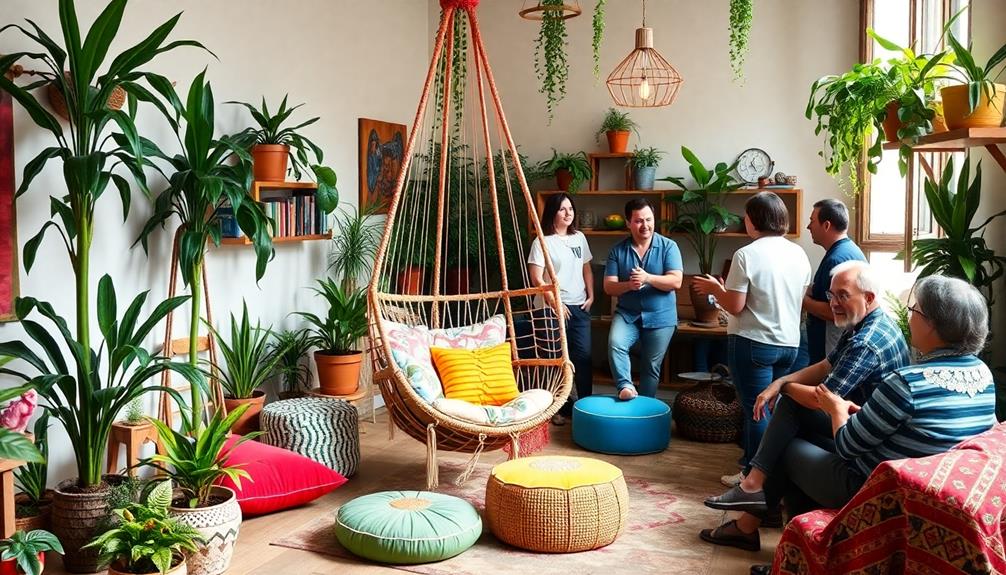
Amid the growing interest in DIY projects, the community around the hanging chair has flourished with enthusiasm and creativity. This surge is reminiscent of the collaborative spirit found in the authors of Positive Thinking Day, who emphasize the importance of community support in personal growth.
You've likely noticed the surge of engagement on social media platforms like TikTok, where users share their unique setups and craftsmanship. With videos amassing over 17.1K views, it's clear that many are keen to showcase their work and inspire others in this DIY journey.
Positive feedback highlights not just the beauty of these chairs but also their functionality. As you navigate this project, you'll find that others appreciate the effort that goes into creating a stunning piece for their homes. The demand for step-by-step guides and patterns is palpable, underscoring the community's desire for shared resources.
Moreover, requests for video tutorials have emerged, suggesting that visual aids can greatly enhance your understanding of the assembly process. While creators like Mallory & Savannah are focused on providing tutorials, there's also growing interest in ready-made options, hinting at a market gap.
Engaging with this vibrant community can elevate your DIY experience, providing support and inspiration along the way.
Frequently Asked Questions
What Is the Best Fabric Choice for Outdoor Hanging Chairs?
When choosing fabric for outdoor hanging chairs, consider weather-resistant materials like solution-dyed acrylic or polyester. These fabrics resist fading, mold, and mildew, ensuring durability while keeping your space stylish and comfortable for relaxation.
How Do I Maintain and Clean My Hanging Chair?
Wondering how to keep your hanging chair looking fresh? Regularly dust it off and spot-clean stains with mild soap and water. For outdoor chairs, protect them from the elements when not in use.
Can I Use Recycled Materials for This Project?
Absolutely, you can use recycled materials for this project! It's a great way to save money and reduce waste. Just make sure the materials are sturdy enough to support your chair and provide safety.
What Are Alternative Designs for a Hanging Chair?
You can explore various designs for a hanging chair. Consider options like macrame, woven rattan, or even suspended fabric hammocks. Each design adds unique flair, enhancing your space's overall aesthetic while ensuring comfort and style.
How Much Weight Can a DIY Hanging Chair Support?
When considering how much weight a DIY hanging chair can support, you should factor in materials, construction, and attachment points. Typically, a well-built chair can hold between 200 to 300 pounds safely, depending on these elements.
Conclusion
You might think building a DIY hanging chair sounds complicated, but it's easier than you'd imagine. By taking it step by step, you'll create a cozy spot that reflects your style and brings comfort to your space. Picture yourself lounging in your beautiful chair, surrounded by friends, enjoying laughter and connection. This project isn't just about craftsmanship; it's about creating memories and a haven where you can unwind and let your boho spirit shine.

